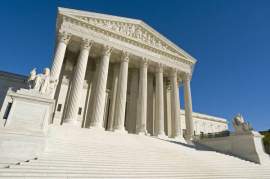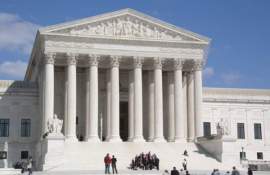
Posadas de Puerto Rico Associates v. Tourism Company of Puerto Rico

Posadas de Puerto Rico Associates v. Tourism Company of Puerto Rico
While free speech rights extend in some forms to commercial speech, when the state has a governmental interest in restricting it, the courts have ruled that this is sometimes acceptable. For example, courts have ruled that bans on cigarette advertising are constitutionally permissible because there is a governmental interest in preventing the public health crisis that cigarette advertising exacerbates. In the 1986 case Posadas de Puerto Rico Associates v. Tourism Company of Puerto Rico, the Supreme Court examined whether a restriction on casino advertising could be considered constitutional based on a test developed for the 1980 Central Hudson case.
Puerto Rico's Games of Chance Act
In 1948, Puerto Rico passed a law called the Games of Chance Act, which allowed the territory to have a regulated and licensed gambling industry. The casinos developed as a result of the Games of Chance Act were intended primarily for use not by Puerto Ricans, but by tourists, as a way to bring money into the island from the mainland United States.
While casinos were allowed to advertise, according to the Games of Chance Act, this advertising was required to take place entirely off-island. All forms of advertising for casinos were prohibited by statute within Puerto Rico itself. The ban on advertising was clarified and expanded by the legislature to include any advertising whatsoever, including the printing of casino names on matchbooks, napkins, and other small items.
The plaintiff in Posadas de Puerto Rico Associates v. Tourism Company of Puerto Rico was a business licensed to operate a Puerto Rican casino in compliance with the Games of Chance Act. It sued alleging that its rights to commercial speech had been violated by the Act, and sought injunctive relief in order to begin advertising within Puerto Rico as well as outside it. After going through two levels of courts in Puerto Rico, the Suprrme Court of the United States granted certiorari.
The Central Hudson Standard
The standard that would eventually be applied to Posadas de Puerto Rico Associates v. Tourism Company of Puerto Rico was called the Central Hudson standard, after the case of Central Hudson Gas & Electric Corp. v. Public Service Commission. This 1980 case established a four-part test for whether a ban on commercial speech was constitutional.
The first part of the test was whether the speech was otherwise lawful and not misleading. The second part asks whether the government interest in regulating the speech was “substantial.” The third is whether the regulation advances the objective in the second part, and the fourth is whether the regulation is broader than necessary to accomplish what it sets out to do.
United States Supreme Court Ruling
The Supreme Court ruled in Posadas de Puerto Rico Associates v. Tourism Company of Puerto Rico that the Games of Chance Act was constitutional. This decision represented a major broadening of the Central Hudson standard, because the territory had presented its justification but did not seem to be required by the court to actually prove that the law would work as planned or that it was narrowly tailored to the problem.



















